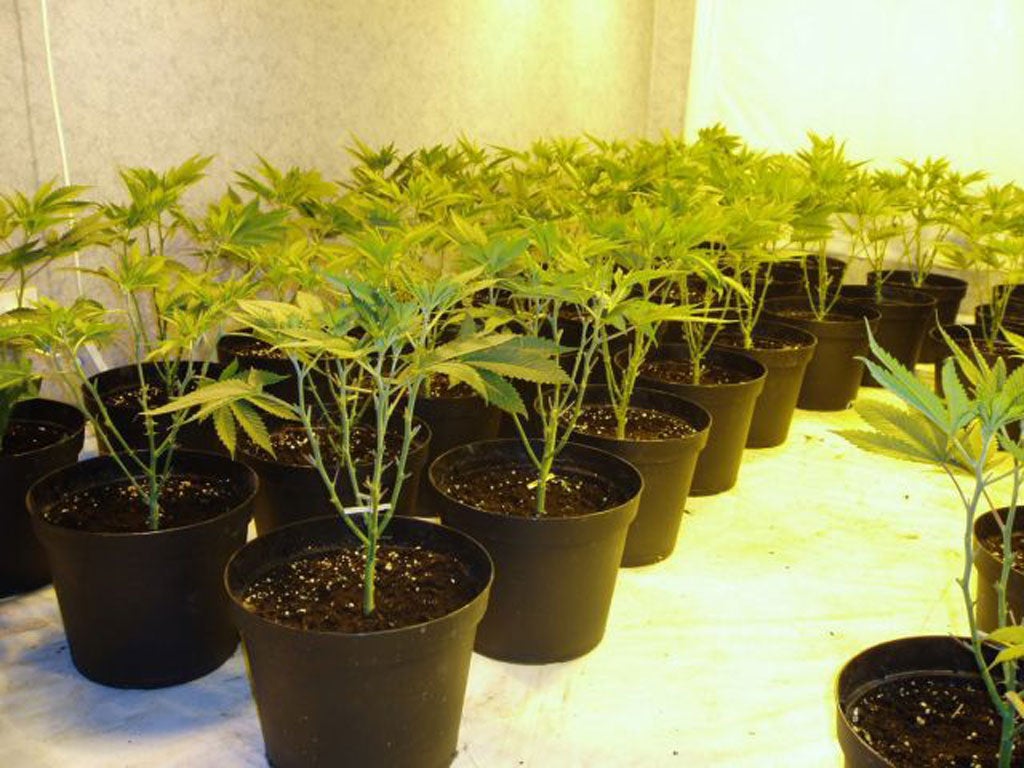25 plants, £40,000 of income: home-grown cannabis blamed for new criminal turf war
Soaring demand for super-strong strains has caused explosion of gun crime

To the websites that promote their seed, the sticky pungent buds of Waikiki Queen, Bob Marley, or Amsterdam Indica provide an easy-to-grow, low-cost alternative to seeking out a drug dealer.
Yet far from being used for postprandial chill-outs by responsible middle-class tokers, cannabis has become the ultimate criminal cash crop and part of an increasingly violent street economy.
Police estimate that when harvested four times a year, 25 cannabis plants – enough to fit on an average-sized kitchen table – can generate an annual turnover of £40,000. The lure of easy money and the burgeoning demand for super-strong home-grown is fuelling a rise in serious crime.
On Merseyside, where police are battling a 33 per cent increase in firearms discharges over the summer, it is estimated that at least a third of the shootings are linked to violent turf wars over cannabis cultivation.
Detectives, who discovered 130 cannabis farms in a single month earlier this year, believe the potential rewards and lenient sentencing are persuading serious crime groups to become involved in a business for which the basic tools are legally available.
Profits are being recycled into the criminal economy with payments for drugs made in guns as well as being used to bankroll heroin and cocaine-dealing operations, it is claimed.
Meanwhile, police intelligence elsewhere in the country has revealed that cannabis is financing gangs who rely on the forced labour of trafficked children from Asia to tend their crops. Last week, a gang leader was jailed for six years after police uncovered a network of cannabis factories in the Midlands and South-east run by a group of Vietnamese and British growers.
Cash generated by the illicit farms, most of which are sited within houses, is being laundered alongside money from prostitution through legitimate operations such as nail bars.
The number of recorded offences this year is expected to reach 16,464 – up from 14,982 in 2010-11, and police believe this is just the tip of the iceberg.
Merseyside's Assistant Chief Constable Andy Ward said the problem in Liverpool is being caused largely by local gangs.
Since April, 22 people have been injured in shootings in the city with one person killed. Most are gang-related with 28 of the last 33 victims refusing to co-operate with police.
He believes there is an increasingly urgent problem nationwide: "We are seeing a big increase in the criminal markets around cannabis.
"At the same time you are seeing the ability of individuals to actually grow cannabis and we are seeing this all over the place – sometimes at factory scale and sometimes in bedrooms within houses but actually to make significant amounts of money."
Countering the growers is not straightforward. There are fears a recent operation to smash cannabis farms around Liverpool may have destabilised the market for the drug, which he estimates is now up to 30 times stronger than it was in the 1960s.
"People are now arguing over drug turf. People are actually taxing drug supply or growers. They will go in and pinch stuff off them. There will be a shooting around it. There will be tit-for-tat between groups," he said.
While communities find themselves terrorised by the gun crime associated with cannabis, there are other victims forced to take part in the cultivation against their will.
Often it will be people who owe money and they [the gangs] will say 'You grow it for us' and there will be someone without any criminal background at all growing cannabis on behalf of other people," said Mr Ward.
Intelligence work carried out by Suffolk Police identified a link between large-scale cannabis production, people trafficking and forced labour for little or no pay in cosmetic nail bars, which were used as a front to launder stolen goods.
Dr Aidan McQuade, director of Anti-Slavery International, said that cannabis production was not a victimless crime. "The reality is that a significant section of the UK's cannabis industry is controlled by ruthless gangs involved in child trafficking," he said.
Legal high? Cannabis and the law
Although cultivating cannabis to supply on a commercial scale carries a maximum sentence of 10 years in jail, the purchase of items needed to grow the drug is legal. A dizzying variety of soil-free hydroponic equipment – lights, nutrients and instruction videos – are freely available on the internet and from so-called "head shops" within the UK. But because of the intensive amount of high-energy 600w lights required to replicate ideal growing conditions, energy companies are able to tip off police when they notice a sudden spike in a domestic electricity usage. Police also use helicopters with infra-red cameras on board to find factories.